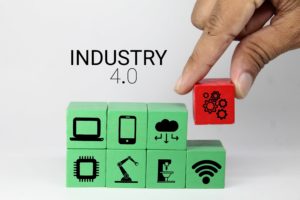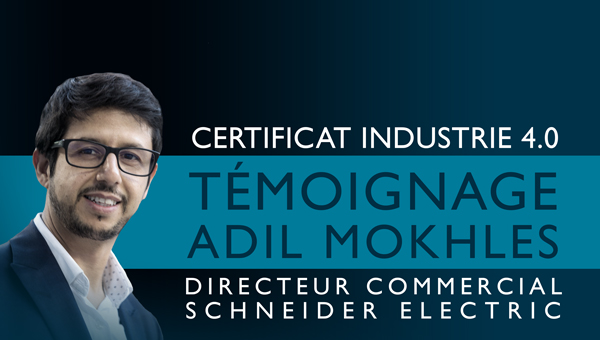
The impact of new digital solutions on Schneider-Eletric
Interview with the Industry Sales Director at Schneider-Electric (Sud Alpes Provence-Côte-d´Azurregion) and member of the Alliance Industry of the Future (AIF): Mr. Adil Mokhles.
01 January 2019 | Dauphine Executive Education

He will be the guide for participants in the IndustryCertificate4.0from Dauphine Executive Education as part of the visit to his 4.0 factory. He brings all his experience through testimony on how Schneider-Electric factories are adapting to new digital solutions and the challenges they encounter.
Shneider Electric is the global specialist in energy management and automation. “We design, manufacture and implement innovative and connected solutions for safe, reliable, efficient and clean energy. As Adil Mokhles precised. About 14 years ago as Head of the Distribution Network for the Bourgogne-Franche Compté region, he then held several positions in trade and marketing in different cities such as Dijon, Lyon or Paris. For over a year, he has been the Regional Industry Director for the Sud Provence Côtes d´Azur region and part of Occitanie (formerly Languedoc Roussillon). He manages a sales team made up of eight sales managers who are in permanent contact with different types of clients: End users (factories, PMI), OEMs or System Integrators in particular.
For Adil Mokhles, Shneider Electric’s leitmotifis “to satisfy the client by fulfilling their needs in terms of automation architecture or technical solutions to better manage the industrial process and optimize machines, to increase productivity and profitability.”
What are the current developments in the industrial world and the new skills sought by companies to adapt to this change ?
“Manufacturers are seeking to improve their competitiveness and their performance while taking into account the protection of the environment. Clients today are more demanding: they need a product of good quality, delivered on time and paid for at the right price” Adil Mokhles emphasizes. This requirement challenges his team to find new solutions to meet this new demand. New technologies, driven by the 4th industrial revolution, help them gain agility and flexibility thanks to this digital revolution; industry 4.0 “factory of the future”.
The challenge for manufacturers is therefore to adapt their factories to the use of digital solutions such as IOT, AI, Big Data, Analytics, 3D printing, VR, AR, etc. in particular the supply chain: innovate to reduce delivery times and support changes in business lines, putting people at the center of all thinking and decisions.
On this last point, Adil Mokhles illustrates this trend with the growing deployment of “Augmented Operators” within factories. This new profession corresponds to outage detection via a touch screen tablet “to diagnose the machine and reduce repair time”.
Schneider Electric factories have already started the shift towards industry 4.0. What does this consist of and what are the economic and organizational impacts that this development generates?
With 200 factories around the world, Adil Mokhles confirms that he is “confronted on a daily basis with issues that manufacturers are familiar with: Competitiveness, performance and respect for the environment”. To meet these challenges, 5 competitiveness levers have been identified following a study conducted jointly by experts and site managers:
- Smart maintenance for machines that are always operational,
- The smart supply chain so that machines are always optimally supplied,
- Training of Augmented Operators to adapt to the new work environment,
- Performance management to make the best use of the industrial tool and improve its performance,
- Energy performance, inseparable from the competitiveness of the plant.
What are the missions and objectives of the Alliance Industry of the Future?
Created in July 2015, “its role is to support French companies and in particular SMIs in the modernization of their industrial tools and the transformation of their economic models by new, digital and non-digital technologies”. With the know-how, the know-how and the skills of the human being at the center of the success of this transformation, “its objective is to reposition the French industry at the center of the economic development of the country, which requires an improvement business competitiveness.” Concludes Adil Mokhles.
Lastest posts
Join us
What are we doing ?
Be the first to read our articles.
monthly Newsletter


